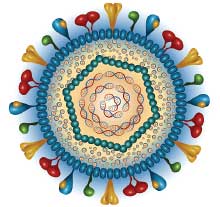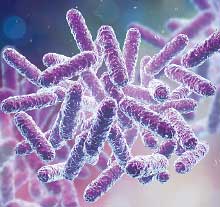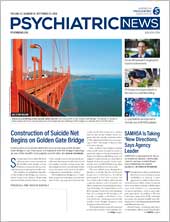Polycystic Ovary Syndrome Linked to Autism
Some research has suggested that elevated levels of prenatal testosterone may increase the risk for autism spectrum disorder (ASD). A study published in Translational Psychiatry suggests that women with polycystic ovary syndrome (PCOS)—a condition in which the ovaries produce more male sex hormones than normal—have a greater risk of autism than those who do not have this disorder. Similarly, these women are more likely to have children with autism.
Researchers at the University of Cambridge and colleagues used electronic health record data to evaluate the association between ASD and PCOS. The available data included 971 women with ASD and over 26,000 with PCOS.
The researchers found an increased prevalence of PCOS in women with ASD compared with women who did not have PCOS (2.3 percent versus 1.1 percent) and elevated rates of ASD in women with PCOS (0.17 percent versus 0.09 percent). They next assessed 8,588 first-born children of women with PCOS and 41,127 women without PCOS and identified ASD in 1.21 percent of PCOS children and 0.76 percent of control children.
After adjusting for psychiatric diagnoses, metabolic disorders, and obstetric complications in the mothers, the researchers found that women with PCOS were 35 percent more likely to have a child with ASD.
“This study finds an association between PCOS and autism, which raises the question of whether early treatments or surveillance might be considered for one condition given the presence of the other,” the authors wrote. However, they cautioned that ASD prevalence was very low in both groups, so the chances of having a child with autism should not be overstated by clinicians.
Herpesvirus May Play Role in Some Psychiatric Illnesses
Researchers at the University of Würzburg in Germany and colleagues have identified higher levels of herpesviruses in brain tissue samples from people with major depressive disorder or bipolar disorder. These findings, which were published in Frontiers in Microbiology, provide evidence that viral infections, even those that stay dormant for long periods, may have some role in psychiatric illness.
Using samples acquired from the brain collection at the Stanley Medical Research Institute, the investigators analyzed samples of cerebellum from 15 people with major depressive disorder, 50 with bipolar disorder, 50 with schizophrenia, and 50 controls with no psychiatric disorder.
They found higher levels of human herpesvirus HHV-6 DNA in patients with bipolar disorder and/or major depressive disorder compared with controls. The viral infections were concentrated in Purkinje cells, large neurons with many branches that regulate motor processes and are believed to play a role in emotion, perception, and language.
Furthermore, there was a significant association between HHV-6 infection and reduced Purkinje cell size. A gene expression analysis on the Purkinje cells suggested the reduced size was the result of an inflammatory response to the viral infection.
Intensive Cognitive Therapy Found Effective for Veterans with Combat Trauma
An intensive three-week outpatient therapy program for veterans with posttraumatic stress disorder (PTSD) can quickly improve symptoms, though such an expedited approach appears to work better for combat-related trauma than military sexual trauma. These findings, from researchers at Rush University Medical Center in Chicago and the University of California, Irvine, were published in BMC Psychiatry.
A total of 191 veterans with PTSD completed the three-week program, consisting of both group and individual cognitive processing therapy sessions as well as mindfulness activities and yoga. The participants were divided into 19 co-ed groups by trauma type; there were 12 groups who had experienced combat trauma and seven who had experienced sexual trauma.
Veterans in both trauma categories experienced large reductions in PTSD symptoms (assessed with the PTSD Checklist for DSM-5) and depression symptoms (assessed with the PHQ-9). At the end of the study, 62.9 percent of veterans in combat cohorts no longer met the diagnostic criteria for PTSD, compared with 35.7 percent of veterans in military sexual trauma cohorts.
They concluded, “[M]ore research is needed to determine which factors impact treatment outcomes in this intensive treatment approach to help improve treatment selection and effectiveness.”
Online CBT Outperformed Online Relaxation Therapy for OCD
Despite some evidence that internet-based cognitive-behavioral therapy (iCBT) can improve symptoms of obsessive-compulsive disorder (OCD), quantifying the level of improvement has been difficult as previous studies have not used truly comparable control groups.
Researchers at Flinders University in Adelaide, Australia, and colleagues conducted a randomized, clinical trial comparing iCBT with internet-based relaxation therapy in 179 adults with OCD.
Both interventions consisted of 12 modules delivered online over a 12-week period. The modules included audiovisual content, demonstrations of techniques, downloadable worksheets, and assistance from licensed therapists. The iCBT modules included cognitive strategies including how to restructure compulsive thoughts as well as techniques related to exposure and response therapy. The relaxation modules included information about the role of anxiety in OCD and how to use relaxation techniques to manage anxiety.
After 12 weeks, the iCBT group demonstrated statistically greater changes in symptoms compared with the relaxation group. Scores on the Yale-Brown Obsessive-Compulsive Scale (YBOCS) decreased by an average of 6.4 points for the iCBT group and 2.9 points for the relaxation therapy group. In addition, 33 percent of iCBT participants achieved what the authors referred to as “reliable recovery” (a YBOCS score below 16) compared with 11 percent of the relaxation group.
“Given the evidence for the efficacy of this intervention alongside other [randomized, controlled trials] using iCBT for OCD, we believe that such interventions hold promise as a routine treatment for individuals with OCD, particularly those with similar symptoms as in this study (for example, a majority with mild-moderate symptoms),” the authors wrote.
This study was published in the Journal of Medical Internet Research.
Oral Microbiome Altered in Children With Autism
Previous studies suggest that bacteria living in the human gut may affect people with autism spectrum disorder (ASD). A study by researchers at the Pennsylvania State University suggests that microbes in the mouths of children with ASD also differ from those of other children.
As published in Autism Research, the investigators collected saliva samples from 180 children with ASD, 106 typically developing controls, and 60 children with nonautistic developmental delay (DD); all the children were between the ages of 2 and 6 years.
They identified 12 groups of microbes that were altered among these three sets of children; these included six microbial groups differentially expressed between the ASD and control children, and three groups that differed between the ASD and DD children. Only one bacterial species, Planctomycetes, was different in each of the three sets of children. The microbial changes in the children with ASD resulted in an oral microbiome with increased lysine degradation, which the authors noted leads to increased production of the neurotransmitter glutamate, and increased energy metabolism.
Further analysis showed that measuring the ratios of some of these key bacteria in the saliva could distinguish children with ASD from controls with 79.5 percent accuracy and differentiate ASD from DD with 76.5 percent accuracy.
Importance of Religion to Parents May Affect Child’s Risk of Suicide
A study appearing in JAMA Psychiatry found that parental belief in the importance of religion is associated with a lower risk for suicidal behavior in their children. This reduced risk did not depend on the child’s own views on the importance of religion.
Researchers at Columbia University Medical Center analyzed data from a three-generation study that assessed the hereditary risks of depression. As part of this study, the researchers looked at suicidal behaviors (ideation/attempts) in second and third generations, which consisted of 214 children aged 6 to 18 from 112 distinct families.
The importance of religion and religious service attendance was associated with a lower risk for suicidal behavior in girls but not in boys. Attendance at religious services was also associated with a lower risk of suicidal behavior in girls but not boys. In contrast, the importance of religion to parents was associated with a lower risk of suicidal behavior in both girls and boys, though the effect was stronger in girls. The average risk reduction (odds ratio of 0.61) was the same whether or not the child also had strong religious beliefs.
“These findings suggest that a parent’s belief in the importance of religion may be a more robust factor than a parent’s attendance at religious services and makes one wonder whether religious importance might be more strongly associated with teaching and beliefs about suicide within the home than is service attendance, or whether some other mechanism might be responsible,” the authors wrote. ■






